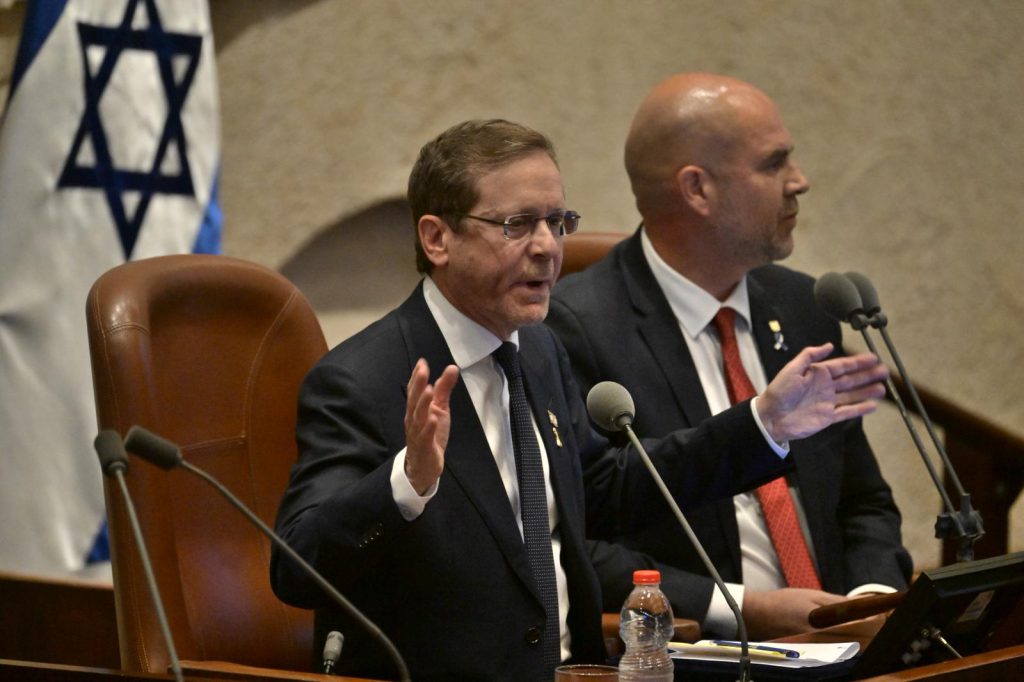Israel’s political disputes are legitimate, but these arguments must be conducted with decorum, with respect for those who hold office, and with esteem for the institutions they represent.
The decline of statesmanship in Israel’s public life has become painfully evident – even, and perhaps especially, in wartime. Instead of demonstrating dignity and respect for the institutions of state, too many of our leaders are mired in petty, partisan battles that corrode public trust.
It was an ordinary Monday at five o’clock, a banal moment in the day, yet the evening news pierced the heart. The broadcast opened with the ceremonial calling to order of the Knesset’s winter session. What should have been a moment of unity and pride turned instead into a small-minded display: the Speaker of the Knesset deliberately ignored the official title of Supreme Court President Justice Yitzhak Amit. Moments later, the same broadcast reported the funeral of Staff Sergeant Itay Yavetz, another young soldier whose life was cut short in the war. We deserve better, I thought to myself. We deserve more dignity, more statesmanship in our public life.
The Knesset’s opening session ought to be a symbol of national unity – a singular event attended by all branches of government, where members, before returning to their daily political skirmishes, pause to honor the democratic institution they serve. Instead, we witnessed yet another mud fight over an honorific. This was not an isolated slip; it is part of a consistent pattern in which the Knesset’s leadership turns constitutional disagreements into spectacles of institutional humiliation. The earlier decision not to invite Justice Amit and the attorney general to President Trump’s Knesset address came from the same dark place. These are not mere mistakes. They are symptoms of a deeper malady.
And all this is happening during a war. Soldiers are dying; their comrades continue to risk their lives on multiple fronts; families are shattered; and the bodies of slain Israeli hostages remain in the hands of Hamas butchers.
Of course, political debate must continue even during war – it is the lifeblood of democracy. But there is a minimum of statesmanship that must never be trampled. When officials who are meant to embody the state – first and foremost the speaker of the Knesset – choose to speak as partisans rather than as custodians of a core national institution, they weaken the very house they are entrusted to protect. The Knesset is not the platform of one camp; it is the house of all Israelis, across all divides.
Statesmanship is not some dusty relic from Ben-Gurion’s speeches; it is the capstone of governance. It should serve as our political system’s North Star – the recognition that institutions are greater than individuals, that mutual respect among government authorities is not a personal courtesy but a condition for the state’s very ability to function and to serve its citizens.
True statesmanship means knowing when to exercise restraint – when the fleeting satisfaction of a headline, a jab, or a wink to one’s political base is outweighed by the long-term public cost: the erosion of trust, the weakening of authority, and the coarsening of civic discourse.
Israel’s political disputes are legitimate – whether over judicial powers, constitutional arrangements, or the role of legal advisers. But these arguments must be conducted with decorum, with respect for those who hold office, and with esteem for the institutions they represent. They must rise above petty provocations.
That should be the norm in ordinary times. In wartime, the bar must be higher still. Soldiers and civilians alike – those who bear the burden of war and those who pay its price – deserve to know that their leaders act with integrity and make decisions in the spirit of national responsibility, not partisan spite.
President Isaac Herzog captured this poignantly when, in response to the slight against the Supreme Court’s chief justice, he said from the Knesset podium:
“This is a very, very significant moment in our national life, and my heart bleeds… There is a difference between an ideological dispute and an affront to human dignity and to the honor of another branch of government.”
We deserve more and better statesmanship – not because it is pleasant, but because it is essential. Statesmanship builds trust and fortifies the institutions of state against the storms of division and doubt. If the Knesset’s leadership, government ministers, and all who steer the Israeli ship of state in these choppy waters adopt statesmanship as their compass – in their words, their decisions, and their public conduct – they will be better able to focus on substance, to manage disagreement with dignity, and to lead from a place of unity rather than division.

